 W
WThis is a list of historic and contemporary dining events, which includes banquets, feasts, dinners and dinner parties. Such gatherings involving dining sometimes consist of elaborate affairs with full course dinners and various beverages, while others are simpler in nature.
 W
WThe Ahwahnee Hotel is a grand hotel in Yosemite National Park, California, on the floor of Yosemite Valley. It was built by the Yosemite Park and Curry Company and opened for business in 1927. The hotel is constructed from steel, stone, concrete, wood, and glass, and is a premier example of National Park Service rustic architecture. It was declared a National Historic Landmark in 1987.
 W
WThe Banquet of the Five Kings was a meeting, in 1363, of the kings of England, Scotland, France, Denmark and Cyprus. It was arranged by Sir Henry Picard, a former Lord Mayor of London. The five kings were:Peter I of Cyprus Edward III of England David II of Scotland John II of France Valdemar IV of Denmark
 W
WA bean-feast is an informal term for a celebratory meal or party, especially an annual summer dinner given by an employer to their employees, probably derived from a tradition in the Low Countries at Twelfth Night. By extension, colloquially, it describes any festive occasion with a meal and perhaps an outing. The word, and its shorter form "beano", are fairly common in Britain, less known in the United States. An alternative derivation refers the name to the eating of a dish of beans and bacon, and seems to trace to 1725, when Daniel Day of Wapping, London began to entertain friends near his estate at Fairlop in Essex on the first Friday in July.
 W
WClan Douglas is an ancient clan or noble house from the Scottish Lowlands.
 W
WOn 16 October 1901, shortly after moving into the White House, President Theodore Roosevelt invited his adviser, the African American spokesman Booker T. Washington, to dine with him and his family; it provoked an outpouring of condemnation from southern politicians and press. This reaction affected subsequent White House practice and no other African American was invited to dinner for almost thirty years.
 W
WA Burns supper is a celebration of the life and poetry of the poet Robert Burns, the author of many Scots poems. The suppers are normally held on or near the poet's birthday, 25 January, known as Burns Night. However, in principle, celebrations may be held at any other time of the year. Burns suppers are held all around the world.
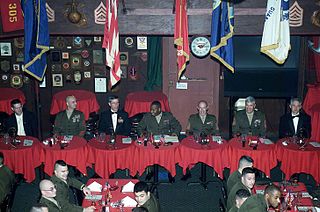 W
WDining in is a formal military ceremony for members of a company or other unit, which includes a dinner, drinking, and other events to foster camaraderie and esprit de corps.
 W
WThe Feast at Swan Goose Gate, also known as the Banquet at Hongmen, Hongmen Banquet, Hongmen Feast and other similar renditions, was a historical event that took place in 206 BC at Hong Gate outside Xianyang, the capital of the Qin dynasty. Its location in present-day China is roughly at Hongmenbao Village, Xinfeng Town, Lintong District, Xi'an, Shaanxi province. The main parties involved in the banquet were Liu Bang and Xiang Yu, two prominent leaders of insurgent forces who rebelled against the Qin dynasty from 209–206 BC.
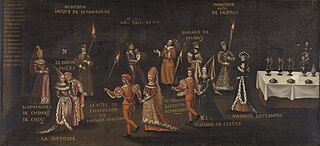 W
WThe Feast of the Pheasant was a banquet given by Philip the Good, Duke of Burgundy on 17 February 1454 in Lille, now in France. Its purpose was to promote a crusade against the Turks, who had taken Constantinople the year before. The crusade never took place.
 W
WThe Last Supper is the final meal that, in the Gospel accounts, Jesus shared with his apostles in Jerusalem before his crucifixion. The Last Supper is commemorated by Christians especially on Maundy Thursday. The Last Supper provides the scriptural basis for the Eucharist, also known as "Holy Communion" or "The Lord's Supper".
 W
WThe term Manchu–Han Imperial Feast refers to a grand banquet held sometime in the Qing dynasty of China (1636–1912). One of the grandest meals ever documented in Chinese culinary history, the banquet reportedly consisted of 108 dishes served in six meals over the course of three days. The dishes themselves involved exotic ingredients and a variety of cooking techniques from every part of Imperial China.
 W
WThe Midwinter Ball is an annual dinner event held in Canberra, Australia. It is hosted by the Federal Parliamentary Press Gallery. The event is notable for being regularly attended by Australian high society.
 W
WThe Nobel Banquet is an annual banquet held on 10 December in the Blue Hall of Stockholm City Hall, after the Nobel Prize ceremony. At the banquet, for which a formal dress code exists, a multi-course dinner is served and entertainment provided. After the dinner, a dance is held in the Golden Hall. The event is broadcast live on Sveriges Television and Sveriges Radio, and abroad with generally high ratings.
 W
WA pancake breakfast is a public meal attached to many festivals, religious celebrations, and community events which involves volunteers cooking large quantities of pancakes and other hot breakfast foods for the general public, often for free or for a nominal charge if the event is a fundraiser.
 W
WThe Pennsylvania Society is an annual weekend retreat for Pennsylvania's politicians and business leaders held in New York City. It began during the late 19th century as a meeting of Pennsylvanians living in New York City who gathered annually beginning in 1899 to discuss events in their home state. As the first few meetings developed into an annual event, it morphed into weekend-long retreat where political networking and fundraising took place in New York's finest clubs, restaurants, and hotels. The main event of the weekend is the "Pennsylvania Society Dinner," which is sponsored by "The Pennsylvania Society," a nonprofit corporation. In recent years the receptions hosted by lobbyists, political committees, and corporations have taken on increased importance.
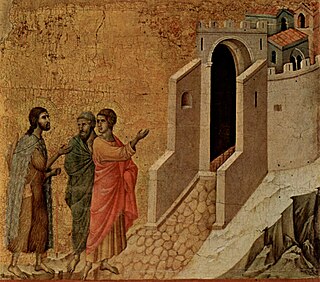 W
WAccording to the New Testament, the road to Emmaus appearance is one of the early resurrection appearances of Jesus after his crucifixion and the discovery of the empty tomb. Both the meeting on the road to Emmaus and the subsequent supper at Emmaus, depicting the meal that Jesus had with two disciples after the encounter on the road, have been popular subjects in art.
 W
WThe Slava is a Serbian Orthodox Christian tradition of the ritual glorification of one's family's patron saint. The family celebrates the Slava annually on the saint's feast day. In November 2014 it was inscribed in UNESCO Intangible Cultural Heritage Lists.
 W
WThe State Dining Room is the larger of two dining rooms on the State Floor of the Executive Residence of the White House, the home of the President of the United States in Washington, D.C. It is used for receptions, luncheons, larger formal dinners, and state dinners for visiting heads of state on state visits. The room seats 140 and measures approximately 48 by 36 feet.
 W
WA state banquet is an official banquet hosted by the head of state in his or her official residence for another head of state, or sometimes head of government, and other guests. Usually as part of a state visit or diplomatic conference, it is held to celebrate diplomatic ties between the host and guest countries. Depending on time of the day, it may be referred to as a state dinner or state lunch. The size varies, but the numbers of diners may run into the hundreds.
 W
WThe centerpiece of contemporary Thanksgiving in the United States and in Canada is Thanksgiving dinner, a large meal, generally centered on a large roasted turkey. Thanksgiving may be the largest eating event in the United States as measured by retail sales of food and beverages and by estimates of individual food intake. People often consume as much as three or four thousand calories during the course of the dinner.
 W
WThursday Lunches were gatherings of artists, intellectuals, architects, politicians and statesmen held by the King of Poland, Stanisław II August during the Enlightenment in Poland.
 W
WA state dinner in the United States is a formal dinner held in honor of a foreign head of state, such as a king, queen, president, or any head of government. It is hosted by the President of the United States and is usually held in the State Dining Room at the White House in Washington, D.C. Other formal dinners for important people of other nations, such as a prince or princess, are called official dinners, the difference being that the federal government does not pay for them. Nowadays these dinners are more often black tie rather than white tie.
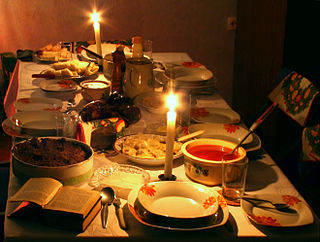 W
WWigilia is the traditional Christmas Eve vigil supper in Poland, held on December 24. The term is often applied to the whole of Christmas Eve, extending further to Pasterka - midnight Mass, held in Roman Catholic churches all over Poland and in Polish communities worldwide at or before midnight. The custom is sometimes referred to as "wieczerza" or "wieczerza wigilijna", in Old Polish meaning evening repast, linked to the late church service, Vespers from the Latin.
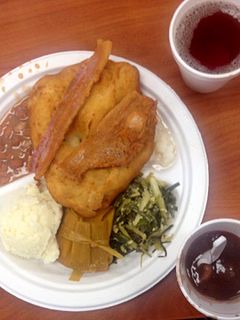 W
WWild Onion dinners are social gatherings held in the spring by various Native American tribes in Oklahoma, especially southeastern tribes. The meals focus on the spring appearance of wild onion, a food that was familiar to most of the tribes east of the Mississippi.